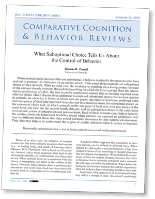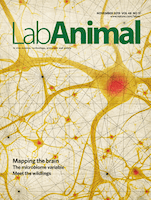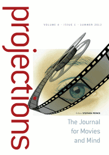
Comparative Cognition & Behavior Reviews
Scope & Guideline
Exploring the depths of animal behavior and cognition.
Introduction
Aims and Scopes
- Interdisciplinary Comparative Research:
The journal emphasizes the importance of drawing insights from multiple disciplines, including psychology, biology, and artificial intelligence, to enrich the understanding of cognition across species. - Inclusion of Diverse Species:
A key aim is to include a wide variety of species, from amphibians and reptiles to invertebrates and livestock, thereby expanding the scope of comparative cognition research. - Focus on Welfare and Ethical Considerations:
The journal promotes research that considers animal welfare and humane endpoints, ensuring that cognitive studies are conducted ethically and responsibly. - Advancing Methodologies in Cognition Studies:
The journal encourages the development and application of advanced methodologies, such as computational models and big team science, to enhance the rigor and impact of comparative cognition research. - Cultural and Evolutionary Perspectives:
It aims to explore cognitive processes through the lens of cultural evolution and ecological contexts, addressing how these factors influence cognition in different species.
Trending and Emerging
- Big Team Science Collaborations:
Recent publications stress the importance of large-scale collaborations to tackle complex questions in comparative cognition, indicating a shift towards collective research efforts. - Computational Approaches to Cognition:
There is a growing trend towards the use of computational models in comparative cognition research, which offers new insights and methodologies for understanding cognitive processes. - Focus on Animal Welfare and Ethics:
An increasing emphasis on humane endpoints and animal welfare in research indicates a significant shift towards ethical considerations in comparative studies. - Exploration of Underrepresented Species:
There is a notable trend towards including lesser-studied species, such as amphibians, reptiles, and invertebrates, to broaden the understanding of cognition across the animal kingdom. - Integration of Artificial Intelligence:
The intersection of artificial intelligence and comparative cognition is becoming a prominent theme, exploring how AI can inform and enhance our understanding of cognitive processes in animals.
Declining or Waning
- Traditional Focus on Similarities:
There appears to be a diminishing emphasis on exploring similarities between species, as recent publications highlight the importance of differences and evolutionary thinking in understanding cognition. - Narrow Species Comparisons:
Research that solely focuses on a limited set of species has become less common, with a growing recognition of the need for broader and more inclusive comparative approaches. - Static Theoretical Frameworks:
Older theoretical frameworks that do not incorporate current findings from interdisciplinary studies may be losing traction, as the field increasingly values dynamic and integrative models. - Limited Scope of Behavioral Studies:
There is a noticeable decrease in studies that focus exclusively on specific behavioral assessments without connecting them to broader cognitive or ecological frameworks.
Similar Journals

ANIMAL BIOLOGY
Connecting Research and Discovery in ZoologyANIMAL BIOLOGY is a distinguished journal published by BRILL, focusing on the dynamic fields of Animal Science and Zoology, as well as Ecology, Evolution, Behavior, and Systematics. With an ISSN of 1570-7555 and an E-ISSN of 1570-7563, this quarterly journal serves as a pivotal platform for researchers and professionals seeking to contribute to the understanding of animal biology across diverse ecological contexts. The journal is recognized with a 2023 Scopus ranking of #234 out of 490 in the Animal Science and Zoology category, placing it within the 52nd percentile, alongside a rank of #409 out of 721 in Ecology, marking a solid contribution to the field. Although it currently holds a Q3 quartile in both categories, its commitment to quality research and novel insights continues to bolster its significance within the academic community. The open access option coupled with its publication history from 2003 to 2024 ensures a wide dissemination of knowledge, drawing in a global audience of researchers, professionals, and students eager to explore the intricacies of animal biology. By promoting high-quality discussions and innovative studies, ANIMAL BIOLOGY plays an essential role in advancing the understanding of life sciences and the evolution of biodiversity.

LAB ANIMAL
Fostering dialogue for a compassionate approach to animal care.LAB ANIMAL, a journal published by NATURE PORTFOLIO, is a prominent source of knowledge in the fields of animal science and veterinary medicine. With its ISSN 0093-7355 and E-ISSN 1548-4475, it serves as a critical platform for researchers, professionals, and students dedicated to the advancement of laboratory animal science. Despite being categorized in the Q4 quartile for Animal Science and Zoology and Q3 for Veterinary (Miscellaneous) in 2023, its contributions are invaluable, reflecting rigorous research and development essential for improving laboratory animal care and ethical research practices. The journal aims to foster innovation and responsive dialogue in an evolving landscape of animal research, promoting a more humane and scientifically sound approach. Although it currently operates under a subscription-based model, LAB ANIMAL continues to be an essential resource for the academic community, providing insights that are integral to advancing both veterinary and animal sciences. The journal has consistently published research since its inception in 1995, engaging a diverse audience with comprehensive studies and discussions that impact the future of the field.

Projections-The Journal for Movies and Mind
Exploring the Intersection of Cinema and CognitionProjections: The Journal for Movies and Mind is a leading scholarly publication dedicated to exploring the intricate relationship between cinema, cognition, and culture. Published by BERGHAHN JOURNALS, this journal has made significant strides since its inception in 2015, achieving impressive rankings in its fields, including a Q1 classification in both Cultural Studies and Visual Arts and Performing Arts for 2023. With an ISSN of 1934-9688 and an E-ISSN of 1934-9696, Projections engages the academic community by delivering innovative research that scrutinizes how films influence and reflect human thought processes and societal structures. While it operates outside the Open Access model, the journal offers critical insights and diverse perspectives that are essential for researchers, professionals, and students alike. With its remarkable impact factor and solid reputation in the arts and humanities domain, Projections serves as an indispensable resource for those dedicated to understanding the psychological and cultural implications of cinematic narratives.

ANIMAL COGNITION
Transforming Perspectives on Animal Minds through Rigorous ScienceANIMAL COGNITION is a prestigious academic journal dedicated to the exploration of cognitive processes in non-human animals, bridging the fields of ecology, evolution, behavior, and cognitive psychology. Published by Springer Heidelberg in Germany, this journal has established itself as a leading platform for innovative research since its inception in 1998, showcasing important findings that enhance our understanding of animal minds. With an impressive impact factor reflected in its Q2 rankings within both the Ecology, Evolution, Behavior, and Systematics and Experimental and Cognitive Psychology categories, ANIMAL COGNITION serves as an invaluable resource for researchers, professionals, and students alike. Although it currently does not offer open access, the journal's rigorous peer-review process ensures the highest quality of published research, making it a vital component of scholarly discourse in the study of animal cognition. As the journal continues to evolve into 2024 and beyond, it remains committed to advancing our knowledge while inspiring future generations of researchers in this fascinating field.

ANTHROZOOS
Connecting Scholars to the Heart of Human-Animal StudiesANTHROZOOS is a premier peer-reviewed journal published by Routledge Journals, Taylor & Francis Ltd, focusing on the interdisciplinary study of human-animal interactions. With a commitment to advancing research in the fields of Animal Science, Anthropology, Sociology, Education, and Veterinary Sciences, this journal serves as a vital platform for scholars and practitioners alike to explore the implications of these relationships in a variety of contexts. ANTHROZOOS maintains a significant impact factor and ranks in the upper quartiles in 2023, showcasing its influence in social sciences and animal studies. Designed for an audience ranging from researchers to professionals and students, the journal not only disseminates original research and critical reviews but also provides insights that can help foster a deeper understanding of how human and animal lives intersect. The journal is hosted in the United Kingdom and does not offer Open Access options, making it a valuable resource within academic institutions. By bridging gaps between disciplines, ANTHROZOOS enhances scholarly dialogue and contributes to the growing discourse in human-animal studies.

JOURNAL OF EXPERIMENTAL PSYCHOLOGY-APPLIED
Advancing the Frontiers of Experimental PsychologyThe JOURNAL OF EXPERIMENTAL PSYCHOLOGY-APPLIED, published by the American Psychological Association, is a premier outlet for cutting-edge research in the field of Experimental and Cognitive Psychology. With an impressive impact factor indicated by its Q1 ranking in 2023, this journal stands as a leading resource for scholars and practitioners, fostering a deeper understanding of the applications of psychological principles. With its extensive coverage from 1995 to 2024, the journal delivers a wealth of empirical studies, theoretical discussions, and methodological innovations that inform both academic learning and practical implementations in psychology. Although the journal does not offer open access options, researchers can gain insights into its influential findings through libraries or institutional subscriptions. Located in Washington, DC, it serves as a critical platform for disseminating high-quality research that bridges the gap between theory and real-world applications, supporting the advancement of knowledge in the vital area of human cognition and behavior.

BMC Veterinary Research
Advancing veterinary science through open access.BMC Veterinary Research, published by BMC in the United Kingdom, stands as a pivotal open-access platform dedicated to advancing the field of veterinary science since its inception in 2005. With an impressive impact factor that reflects its influential presence, this journal has achieved a remarkable ranking of #17 out of 194 in the Scopus Veterinary category, placing it in the 91st percentile among its peers. The journal serves as an essential resource for researchers, professionals, and students alike, fostering the dissemination of high-quality research and innovative practices within the veterinary and broader medical communities. With its commitment to open access, BMC Veterinary Research ensures that valuable insights are accessible to all, promoting collaboration and knowledge sharing that drive the advancement of veterinary sciences. As it continues to publish significant findings until 2024, it remains a key contributor to the contemporary discourse on animal health and welfare.

Zoological Letters
Empowering the global scientific community through collaboration.Zoological Letters, published by BMC, is a premier open-access journal dedicated to advancing the field of zoology and animal science. Since its inception in 2015, the journal has established itself as a critical platform for researchers to disseminate their findings and contribute to the ongoing discourse in this vibrant discipline. Based in the United Kingdom, Zoological Letters boasts an impressive Q2 category ranking in Animal Science and Zoology for 2023, placing it within the top 25% of journals in the field. With a Scopus rank of #116 out of 490, representing the 76th percentile, it showcases the influence and reach of the research published within its pages. The journal’s substantial focus on contemporary issues and methodologies ensures that it is a vital resource for academics, professionals, and students alike, fostering innovation and collaboration throughout the global scientific community. Open access since 2015, Zoological Letters is committed to making scientific knowledge accessible, thus enhancing the visibility and impact of research in zoological studies.

Journal of Cultural Cognitive Science
Fostering Dialogue Between Culture and Cognitive ScienceThe Journal of Cultural Cognitive Science, published by SpringerNature, is an esteemed forum for researchers and scholars dedicated to exploring the intersection of culture, cognition, and language. With its ISSN 2520-100X and E-ISSN 2520-1018, this journal has made significant strides since its inception in 2017, covering a wide array of topics pertinent to Experimental and Cognitive Psychology and Linguistics and Language. Notably, it has achieved remarkable recognition, ranking in the Q3 category for Experimental and Cognitive Psychology and Q1 for Linguistics and Language in 2023. Its Scopus ranks further illustrate its impact, with the journal positioned at the 89th percentile in Social Sciences - Linguistics and Language and 47th percentile in Psychology. Despite its ongoing journey, it continues to foster open dialogue and innovation among professionals, researchers, and students, providing valuable insights and advancing knowledge in the field.

BELGIAN JOURNAL OF ZOOLOGY
Elevating Zoological Research to New Heights.The BELGIAN JOURNAL OF ZOOLOGY, published by the Royal Belgian Zoological Society, serves as a prominent platform for advancing research in the field of zoology. With an impact factor reflecting its status within the academic community, this journal rigorously publishes innovative studies and reviews, covering a broad spectrum of topics related to animal science and zoology. As an esteemed outlet, the journal ranks in the Q2 category for both Animal Science and Zoology, demonstrating its relevance and contribution to the field, as indicated by its Scopus ranking of 255 out of 490. Although it operates under a subscription model, the journal is committed to disseminating high-quality research that can shape contemporary understanding of animal biology and ecology. With a publication history dating back to 1990 and extending through 2024, researchers, professionals, and students are encouraged to engage with its rich content, which is vital for ongoing discourse and discovery within zoological sciences.